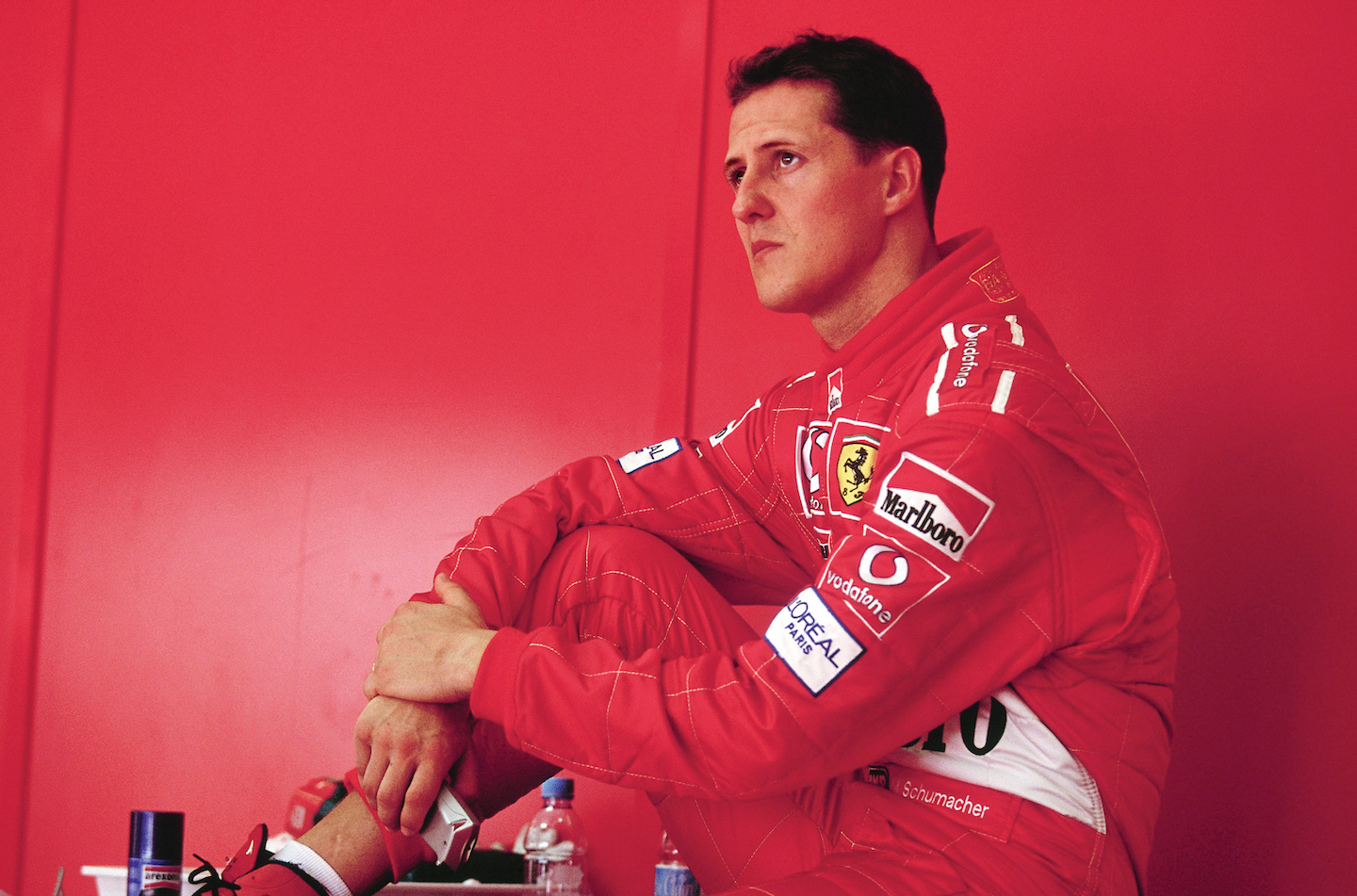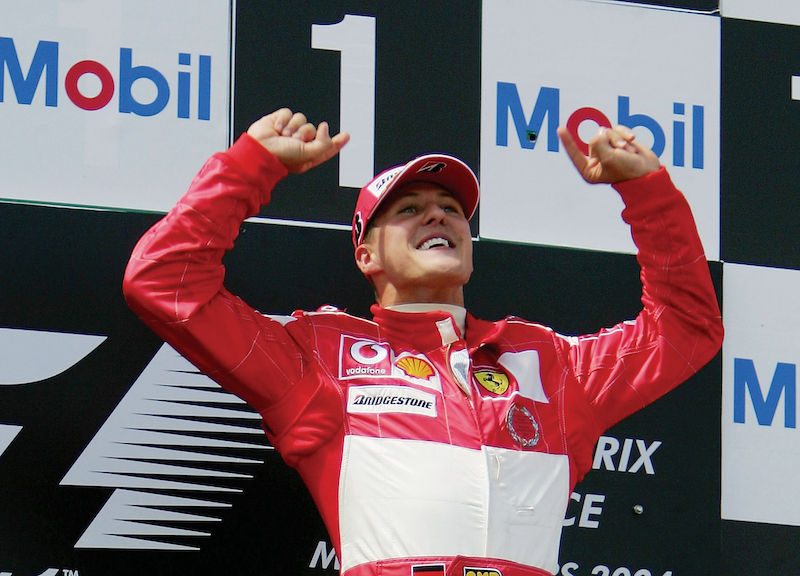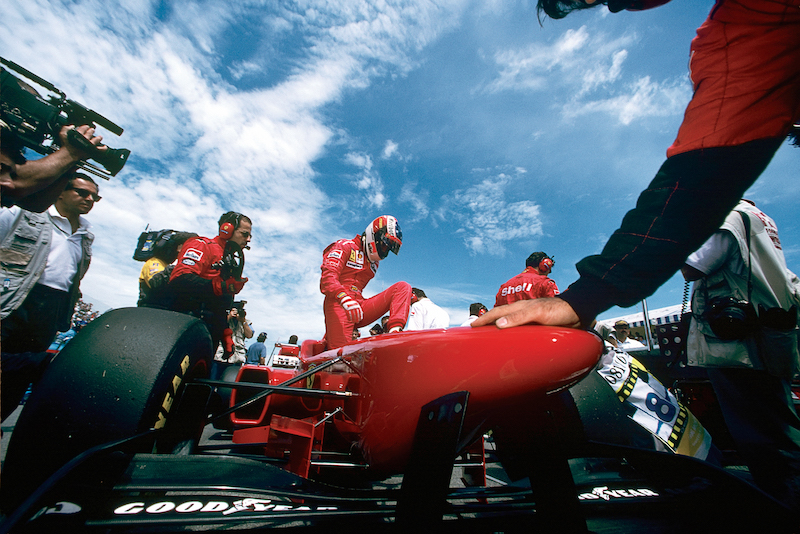
The German racer is a shining star of the sport and universally hailed as one of its most talented (All photos: Getty Images)
If you have never seen a Formula One race live, you will not be able to fully comprehend the ear-splitting screech of the cars’ engines as they race along the circuit at speeds in excess of 200kph. At 134 decibels, it is a lot to take even for die-hard fans — including those who can tell which engines are from which year based on the rev alone. It is one of the inexplicable aspects of the sport that few people will profess to enjoy, but that still inspires a great deal of excitement.
The same thing could be said about Michael Schumacher. Love him or loathe him for who he was on the track, the German racer is a shining star of the sport and universally hailed as one of its most talented. Having achieved most of his wins with Ferrari after a stint at Benetton, he ended his career with Mercedes, disappearing from the public eye in 2013 after a skiing accident. The only update fans ever got was from his manager Sabine Kehm, who said he was no longer in a coma and would rehabilitate at home. This was in 2014, and there has been no news since.
A documentary titled Schumacher released in conjunction with the 30th anniversary of his F1 debut does little to assuage our collective curiosity on his current health status, but it does paint a magnificent picture of two very different sides to the German racer — that of family man and F1 icon. The four-person team behind the film — co-directors Hanns-Bruno Kammertöns, Vanessa Nöcker and Michael Wech, and producer Benjamin Seikel — combined old footage provided by Schumacher’s family, hundreds of hours’ worth of material from F1’s archives and interviews with the largest names in sport to tell their story of his colourful career and, more importantly, his life beyond the pit and paddock.
gettyimages-51023710_ccliverose_gettyimages.jpg

By working with Schumacher’s wife, Corinna, and his children, Gina-Marie and Mick — who has followed in his father’s footsteps as a racer — the directors were able to access a lot more material than would have otherwise been possible. By this, we do not mean just home videos of family holidays and wedding pictures, but also the willing participation of quite so many F1 nobs. Interviews include, but are not limited to, the famously reclusive former chief executive of the Formula One Group Bernie Ecclestone, Ross Brawn, David Coulthard, Damon Hill, Mika Häkkinen, Luca di Montezemolo and Jean Todt. For long-time fans, seeing these names come alive is both nostalgic and exciting.
As former F1 journalists James Allen and Richard Webber “narrated” the course of the documentary, it soon emerges that Schumacher is so much more than just humanising a hero — it also showcases F1 as the sport it once was. The gritty, unsexy bits of mechanics working late into the night, the emphasis on the driver rather than the quasi-rockets that the cars are today — it was a nostalgic trip back in time to what many fans would consider the glory days of the sport.
Schumacher joined F1 when Ayrton Senna was World Champion with McLaren, Alain Prost was with Ferrari and Nigel Mansell was driving for Williams — it was a different era for motorsport altogether, one defined more by the power and skill of the drivers than the technology that fuels the cars from the paddocks today. It was also when F1 racers started to become celebrities in their own right, commanding media attention beyond the sports pages. Handsome, competitive and ultra-fast Senna led the charge, with Schumacher’s youth and vitality coming in a close second. He hated it.
It is easy to point out his incredible work ethic — for example, old footage of him working with the mechanics on the car late into the night — but comparisons with racers today are unfair simply because F1 has fundamentally changed in so many ways. There can never be another Schumacher, or Senna for that matter, because the Lewis Hamiltons and Daniel Ricciardos of today are not quite playing the same kind of game anymore.
It felt like this was a film made with a clear intention — to tell the tale of Schumacher, but also the period in which he succeeded. Co-director Wech knew exactly what he was looking for when he went through Formula One Management’s thousands of hours of archived footage, and pulled out not just key racing feeds but also a generous amount of behind-the-scenes material that exposes a previously unseen side of Schumacher and the nature of the sport he was dealing with.
gettyimages-826743814_cgettyimages.jpg

This was Corinna’s intent as well — her husband is an intensely private man and fought to construct an infallible impression of himself, when this was not true. For example, there are repeated pointers in Schumacher to the innate self-belief that he never did wrong, which was a trait that surrounded some of his more controversial moments. When Senna addressed their collision in 1992, Schumacher said nothing and took zero responsibility. Brawn revealed that it was only after watching the replay that Schumacher realised he was at fault during a 1997 crash with Jacques Villeneuve, and he never took any blame for running into the back of a McLaren in 1998 either. In fact, when asked by Coulthard whether he had ever made a mistake, Schumacher replied, “Not that I remember.”
He was not always so self-assured, though. Despite his competitive relationship with Senna, Schumacher was deeply troubled by his untimely death and suffered from sleepless nights for a while afterwards. Fighting back tears, Schumacher also opened up about a test he had completed at Silverstone just after the tragic 1994 Imola weekend where, driving a road car around the circuit, he had become obsessed with thoughts of where on the track he could suffer a fatal accident. Years later, having matched the Brazilian’s 41 F1 victories at the 2000 Italian Grand Prix, Schumacher broke down in uncontrollable sobs at the post-race press conference.
Senna has had a similarly powerful effect on many F1 fans, and the footage of his crash is haunting to this day. Watching it in the context of Schumacher’s position of constant competitor and eventual winner of the race during which Senna lost his life provides new perspective — it is suddenly apparent how deeply this incident would have affected him. Schumacher’s own grief, which he articulates so beautifully in the film, was painful to watch.
In the later part of the film, his role as father and husband starts to take precedence as he takes on different assignments that leave him with more time for family. During the two years he spent as Ferrari’s adviser and Jean Todt’s “super assistant”, Schumacher would find a love for adventure sports such as skydiving. He joined Mercedes in 2009 not as a racer but an elder statesman of the sport that, by this time, better resembled the way it plays out today.
Perhaps he knew this was no more the F1 he grew up with. We will never know this, because as his final chapter played out with Mercedes, it was ultimately the draw of his family that ended the F1 book for him. In the film, Kehm recalls him saying, “What am I doing here? I miss my family. Why am I so far away? I’ve realised it isn’t as important as it used to be. My family is more important now.” He would spend a full year with his family before the guardian angel that kept him safe on the track missed that fateful skiing trip in Méribel, France, that changed his and his family’s life forever.
“Since the accident, of course, these experiences, these moments that I believe many people have with their parents, are no longer present, or to a lesser extent,” says Mick, providing the tiniest insight into their family life. “And in my view, that is a little unfair.” His mother is more sanguine, and her final words on the matter are filled with sadness, relief and hope. “Of course I miss Michael every day,” she says. “But it’s not just me who misses him. The children, the family, his father, everyone around him. I mean, everybody misses Michael, but Michael is here. Different, but he’s here, and that gives us strength.”
For someone who has listened to the screeches of the F1 engines for most of her adult life, the silence must truly be deafening. How we long to hear the screeches — those made by his wheels — again.
This article first appeared on Sept 27, 2021 in The Edge Malaysia.


